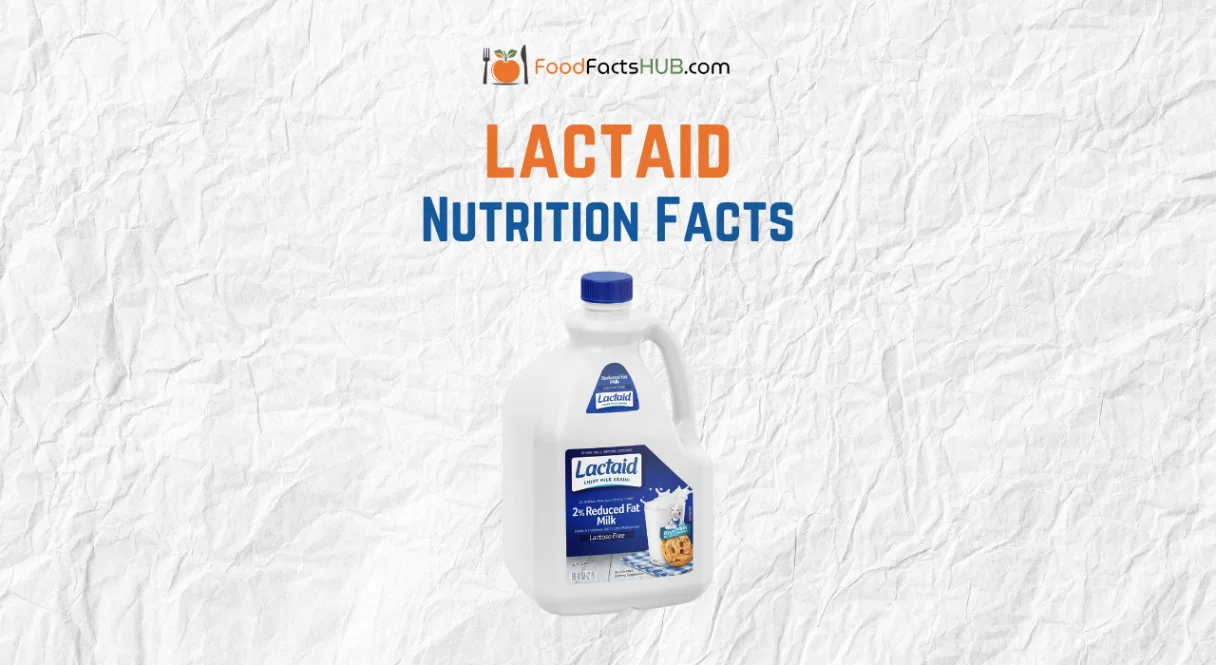The pictures in our articles might not always show exactly what the text is talking about. We use these images to make the article more interesting and eye-catching. They are there to add to the text, but not to replace it or show every detail.
Lactaid milk has become a popular choice for individuals who struggle with lactose intolerance but still want to enjoy the nutritional benefits of dairy. As we delve into the Lactaid nutrition facts, it's important to understand what sets this product apart from regular milk and why it's a valuable alternative for many consumers.
Lactaid milk is essentially regular milk that has been treated with the enzyme lactase, which breaks down lactose, the natural sugar found in milk. This process makes the milk digestible for people who lack sufficient lactase in their digestive systems. But how does this treatment affect the overall nutritional value of the milk? Let's explore the Lactaid nutrition facts in detail to answer this question and provide a comprehensive overview of this lactose-free option.
The Basics of Lactaid Nutrition Facts
Caloric Content and Macronutrient Breakdown
One of the first things consumers look at when examining Lactaid nutrition facts is the calorie content and macronutrient breakdown. Lactaid offers several varieties of milk, each with its own nutritional profile:
| Lactaid Variety | Calories per Cup | Fat (g) | Carbohydrates (g) | Protein (g) |
|---|---|---|---|---|
| Whole Milk | 160 | 8 | 12 | 8 |
| Reduced-Fat 2% | 130 | 5 | 13 | 8 |
| Fat-Free | 90 | 0 | 13 | 8 |
As we can see from this table, the Lactaid nutrition facts vary primarily in terms of fat content and calories, while the carbohydrate and protein content remain relatively consistent across varieties.
Essential Vitamins and Minerals in Lactaid Milk
A key aspect of Lactaid nutrition facts is the vitamin and mineral content. Lactaid milk is an excellent source of several essential nutrients:
- Calcium: Provides 30% of the daily value in whole milk and 50% in calcium-enriched varieties
- Vitamin D: Contains 25% of the daily value in whole and reduced-fat varieties
- Vitamin A: Offers 6-10% of the daily value
- Riboflavin: A good source of this B-vitamin
- Vitamin B12: Contains significant amounts of this essential vitamin
- Phosphorus: Provides a substantial amount of this mineral
- Potassium: A good source of this important electrolyte
Protein Content: A Closer Look
When examining Lactaid nutrition facts, it's important to note the protein content. Regular Lactaid milk contains 8 grams of high-quality protein per cup, which is identical to regular milk. However, Lactaid also offers a protein-fortified whole milk variety that contains 13 grams of protein per cup, making it an excellent choice for those looking to increase their protein intake.
Comparing Lactaid Nutrition Facts to Regular Milk
Similarities in Nutritional Value
One of the most frequently asked questions regarding Lactaid nutrition facts is how they compare to regular milk. The good news is that Lactaid milk provides virtually the same nutritional benefits as regular milk:
- Protein content is identical (except in protein-fortified varieties)
- Calcium levels are the same or higher in fortified versions
- Vitamin D content is equivalent
- Other essential nutrients like vitamin A, riboflavin, and B12 are present in similar amounts
The Key Difference: Lactose Content
The primary difference in Lactaid nutrition facts compared to regular milk is the lactose content. While regular milk contains about 12 grams of lactose per cup, Lactaid milk contains only trace amounts, making it suitable for those with lactose intolerance.
Health Benefits of Lactaid Milk Based on Nutrition Facts
Supporting Bone Health
The calcium and vitamin D content highlighted in Lactaid nutrition facts play a crucial role in maintaining strong bones and teeth. A single cup of Lactaid milk can provide up to 50% of the daily recommended intake of calcium, making it an excellent choice for supporting bone health.
Muscle Recovery and Growth
The high-quality protein found in Lactaid milk, as noted in its nutrition facts, is beneficial for muscle recovery and growth. This makes it a popular choice among athletes and fitness enthusiasts, especially the protein-fortified variety.
Digestive Comfort for Lactose Intolerant Individuals
Perhaps the most significant benefit of Lactaid milk, as reflected in its nutrition facts, is the ability to provide all the nutritional benefits of milk without causing digestive discomfort in lactose intolerant individuals.
Lactaid Nutrition Facts: A Deeper Dive into Micronutrients
Vitamin Content Analysis
Let's take a closer look at the vitamin content in Lactaid nutrition facts:
- Vitamin A: Essential for eye health and immune function
- Vitamin D: Crucial for calcium absorption and bone health
- Vitamin B12: Important for nerve function and red blood cell formation
- Riboflavin (B2): Aids in energy production and cellular function
Mineral Profile Breakdown
The mineral content in Lactaid nutrition facts is equally impressive:
- Calcium: Essential for bone health, muscle function, and nerve signaling
- Phosphorus: Works with calcium to build strong bones and teeth
- Potassium: Important for heart health and muscle function
- Zinc: Supports immune function and wound healing
Understanding Lactaid Nutrition Facts: Fat Content and Heart Health
Saturated Fat in Different Lactaid Varieties
When examining Lactaid nutrition facts, it's important to consider the saturated fat content:
- Whole Milk: 5 grams of saturated fat per cup
- Reduced-Fat 2%: 3 grams of saturated fat per cup
- Fat-Free: 0 grams of saturated fat per cup
Balancing Fat Intake and Nutritional Benefits
While saturated fat has been associated with heart health concerns, recent research suggests that dairy fat may not have the same negative impact as once thought. However, for those monitoring their saturated fat intake, the reduced-fat and fat-free options provide the same essential nutrients with less fat.
Lactaid Nutrition Facts: Carbohydrates and Blood Sugar Impact
Carbohydrate Content Across Varieties
As seen in the Lactaid nutrition facts, the carbohydrate content remains relatively consistent across varieties:
- Whole Milk: 12 grams per cup
- Reduced-Fat 2%: 13 grams per cup
- Fat-Free: 13 grams per cup
Glycemic Index and Blood Sugar Response
Despite being lactose-free, Lactaid milk still contains natural milk sugars. However, the presence of protein and fat (in whole and reduced-fat varieties) helps to moderate the blood sugar response, making it a relatively low glycemic index food.
Lactaid Nutrition Facts: Fortified Varieties and Enhanced Nutrition
Calcium-Fortified Lactaid Milk
Some Lactaid milk varieties are fortified with additional calcium, providing up to 50% of the daily value per cup. This is particularly beneficial for individuals who may need extra calcium in their diet, such as postmenopausal women or those at risk of osteoporosis.
Vitamin D Fortification in Lactaid Milk
All Lactaid milk varieties are fortified with vitamin D, providing 25% of the daily value per cup. This is crucial as vitamin D aids in calcium absorption and is often lacking in many people's diets.
Lactaid Nutrition Facts: Comparing Different Product Lines
Lactaid Milk vs. Lactaid Cottage Cheese
While this article focuses primarily on Lactaid milk nutrition facts, it's worth noting that Lactaid also produces other dairy products like cottage cheese. Here's a quick comparison:
| Product | Calories per Serving | Protein (g) | Fat (g) | Carbohydrates (g) |
|---|---|---|---|---|
| Lactaid Whole Milk (1 cup) | 160 | 8 | 8 | 12 |
| Lactaid Cottage Cheese (1/2 cup) | 90 | 12 | 2.5 | 5 |
As we can see, Lactaid cottage cheese provides more protein with fewer calories and carbohydrates compared to whole milk.
Lactaid Milk vs. Lactaid Ice Cream
Lactaid also offers ice cream products. While these are treated to be lactose-free, their nutrition facts differ significantly from milk:
| Product | Calories per Serving | Protein (g) | Fat (g) | Carbohydrates (g) |
|---|---|---|---|---|
| Lactaid Whole Milk (1 cup) | 160 | 8 | 8 | 12 |
| Lactaid Vanilla Ice Cream (1/2 cup) | 170 | 3 | 9 | 19 |
The ice cream is higher in calories, fat, and carbohydrates, but lower in protein compared to milk.
Understanding Lactaid Nutrition Facts: Allergies and Sensitivities
Milk Allergy vs. Lactose Intolerance
It's crucial to understand that Lactaid milk is not suitable for individuals with milk allergies. Lactaid nutrition facts are relevant for those with lactose intolerance, which is different from a milk allergy:
- Lactose Intolerance: Inability to digest lactose due to lack of lactase enzyme
- Milk Allergy: Immune system reaction to milk proteins
Lactaid milk still contains milk proteins and is therefore not safe for those with milk allergies.
Lactaid Nutrition Facts in a Balanced Diet
Incorporating Lactaid Milk into Daily Nutrition
Given its nutritional profile, Lactaid milk can be an excellent addition to a balanced diet. Here are some ways to incorporate it:
- Use in breakfast cereals or oatmeal
- Add to smoothies for extra protein and calcium
- Use in cooking and baking as a substitute for regular milk
- Enjoy as a post-workout recovery drink
Lactaid Milk and Weight Management
The varying fat content in different Lactaid milk varieties allows for flexibility in calorie management:
- Fat-free Lactaid milk (90 calories per cup) can be a good choice for those watching their calorie intake
- Whole Lactaid milk (160 calories per cup) may be more satiating due to its higher fat content
Conclusion: The Value of Understanding Lactaid Nutrition Facts
In conclusion, a thorough examination of Lactaid nutrition facts reveals that this lactose-free milk option provides virtually all the nutritional benefits of regular milk without the digestive discomfort associated with lactose intolerance. From its rich calcium and vitamin D content to its high-quality protein, Lactaid milk can be an excellent addition to a balanced diet.
Understanding Lactaid nutrition facts empowers consumers to make informed decisions about their dairy consumption. Whether you're looking to support bone health, increase protein intake, or simply enjoy milk without digestive issues, Lactaid offers a range of options to suit various nutritional needs and preferences.






